"Deadly Cancer" Signs You Need to Know, Say Doctors — Eat This Not That - Eat This, Not That
Many cancers can be treated if caught early, so knowing signs to look out for is vital. Not skipping your annual screenings, paying attention to changes in your body and speaking with your doctor regularly can be a matter of life and death. Eat This, Not That! Health talked to experts who explained deadly signs of cancer to watch out for and why. Read on—and to ensure your health and the health of others, don't miss these Sure Signs You've Already Had COVID.

Dr. John Diaz, chief of gynecologic oncology at Miami Cancer Institute, part of Baptist Health South Florida explains, "What is considered normal bowel and bladder habits are different for each person. If you notice a change from what is normal for you, it is time to mention it to a doctor. Constipation or diarrhea can indicate a lot of medical concerns, one of which can be as a cancer symptom. It is important to pay attention to your stool and notice if it changes or has blood in it. Change in urination, especially an increase in the frequency in urination, could be related to bladder cancer or many gynecologic cancers. Also, if you are experiencing pain or blood while urinating, you should track this symptom and let your doctor know about it. Blood in your urine is generally the first sign of bladder or kidney cancer, but it's also a symptom for many gynecologic cancers like ovarian or vaginal cancer."

Dr. Diaz says, "The vulva is the outer surface area of the female genitals. Things to look out for include changes to the color or texture of the skin, such as a rash, sores or warts. It is also important to pay attention to itching, burning or pain that does not go away on the vulva, which can be signs of vulvar cancer."
RELATED: What "Mild" COVID Actually Feels Like

"Many women live a hectic life and in turn are normally tired," Dr. Diaz states. "But it is not normal to be extremely tired at all times. Fatigue could be a symptom because the cancer cells use up much of the body's energy supply."
RELATED: Omicron Spreads By Going Here, Say Experts

Dr. Diaz says, "Most women dream that their extra pounds would just melt away. But if you have lost 10 or more pounds without changing your exercise habits or diet, it could signal a problem. While the cancer symptom of having difficulty eating could play a role in weight loss, completely different causes related to cancer could be behind weight loss. Unexplained weight loss happens most often with pancreatic, stomach or lung cancer but can be seen with a range of cancers. This could also be a symptom of an issue with your thyroid."
Dr. Jesse P. Houghton, MD, FACG Senior Medical Director of Gastroenterology SOMC Gastroenterology Associates adds, "The most common symptom across the board with any type of cancer is unintentional weight loss. This may not be present when the cancer is just beginning, but is extremely common with advanced cancer. Now, I would caution you not to worry too much if you have unintentional weight loss, as there are other possible explanations (overactive thyroid, uncontrolled diabetes, depression). When I have someone come to my office with unintentional weight loss, I always look for a condition that could explain this. So, I ask for any other accompanying symptom, as this directs me toward the source of the potential cancer. For example, weight loss with new onset constipation or rectal bleeding, points toward a possible colon or rectal cancer. Weight loss with blood in the urine, points toward a bladder or prostate cancer. Weight loss with a new cough or coughing up blood, could indicate lung cancer. Weight loss with jaundice (yellowing of the eyes), could mean pancreatic or liver cancer. Likewise, if someone has weight loss with abnormal vaginal bleeding, they should undergo a pelvic exam to rule out uterine or cervical cancer. I therefore recommend paying attention to your body and any new symptoms that you may have, especially if they don't go away or are associated with unintentional weight loss."
RELATED: Strange COVID Symptoms No One Talks About

Dr. Daniel Boyer of Farr Institute explains, "Prostate cancer is a type of cancer that affects the prostate glands in men. It is the second-leading contributor of cancer deaths for most men in the United States. It normally develops when the rate of cell division exceeds the rate at which cells are dying in the prostate gland. Prostate cancer may not show any signs or symptoms during its early stages of development, however, some deviations from the normal body functioning may be an indication of developing prostate cancer soon. These early signs are known as prostate cancer risk factors. The most common prostate cancer risk factor is a change in the way a man urinates characterized by; difficulty in starting to urinate or emptying your bladder, a weaker flow of urine while urinating, dribbling urine after urinating, urge to urinate-especially at night, and an abrupt need to urinate. In addition, urine may start coming out even before reaching the bathroom." And to protect your life and the lives of others, don't visit any of these 35 Places You're Most Likely to Catch COVID.

Comments
Post a Comment